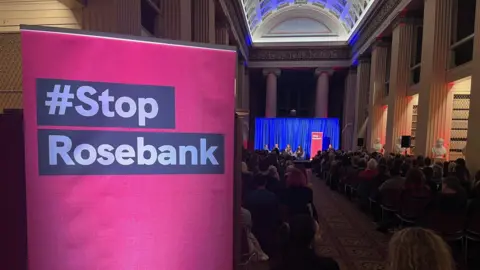Legal challenge to Rosebank oil and Jackdaw gas fields begins

 PA Media
PA MediaA legal challenge over the decision to give consent to the UK’s largest untapped oil field is set to begin.
A judicial review brought jointly by the environment groups Greenpeace and Uplift is due to be heard at the Court of Session in Edinburgh.
The campaigners want to stop the development of Rosebank oil field, which is off Shetland, and the Jackdaw gas field, off Aberdeen. But oil companies say the projects are vital.
If the challenge is successful, operators would have to resubmit environmental impact assessments for approval before drilling can begin.
It is understood the oil companies will accept that the decision to give the go-ahead was unlawful – because the emissions they would create were not properly assessed – and will not challenge it.
Instead, they are expected to focus on how to move forward, given that work is already under way.
What is the judicial review about?
Consent for drilling in the Rosebank field was granted by the regulator, the North Sea Transition Authority (NSTA), in September last year.
Shell’s proposals to develop the Jackdaw field were approved by the NSTA in 2022, after initially being rejected on environmental grounds.
The environment groups say that when consent was granted for the fields, the impact of emissions caused by burning extracted oil and gas was “unlawfully ignored” by regulators.
Uplift accused regulators of “failing to be transparent” in granting the consents and said Rosebank would damage marine life in the North Sea.
 PA Media
PA MediaThe UK government said in August that it would not fight any cases over Rosebank and Jackdaw.
It effectively accepted the original decisions were unlawful.
This came after the Supreme Court ruled in June that regulators must consider the total environmental impact of new projects – including the way fossil fuels are used by end consumers.
The Supreme Court’s decision could still be challenged by either side.
What do the campaigners say?
Philip Evans, of Greenpeace UK, said: “Earlier this year, the Supreme Court made it crystal clear that the climate impact of emissions from burning fossil fuels must be assessed before any new oil and gas projects can be approved.
“It’s these types of emissions that are causing the climate chaos we’re seeing all over the world.
“But oil companies want to keep drilling for maximum profits whilst ignoring the damage they’re doing.
“That’s why we are taking Shell, Equinor and Ithaca to court to stop them in their tracks.”
Tessa Khan, executive director of Uplift, said Rosebank should never have been approved.
She said: “Rosebank is a terrible deal for Britain. It’s mostly oil for export, which would do nothing to lower fuel costs or boost our energy security yet, because of huge tax breaks for new drilling, the UK public would effectively cover almost all of the costs of developing it while the oil companies walk off with the profits.
“It won’t provide long-term security for oil and gas workers either.
“Even with new fields being approved, jobs supported by the industry have more than halved in the past decade. Workers need clean-energy jobs that have a long-term future.”
Lord Deben, former chairman of the government watchdog the Climate Change Committee, said: “Rosebank and Jackdaw should never have been approved by the previous government.
“These fields will do nothing to help the UK’s energy security or lower our bills because the oil and gas will be sold on the international market. They will only fuel more floods, fires and droughts all over the world.”
What do the oil companies say?
Norwegian energy giant Equinor and British firm Ithaca Energy jointly own the Rosebank field.
They have said it would create about 1,600 jobs during its construction and support about 450 UK-based jobs during its lifetime.
Equinor declined to comment while the court challenge was ongoing, but said it was continuing to “work closely with all relevant parties to progress the project”.
It added: “It is vital for the UK and will bring benefits in terms of local investment, jobs and energy security.”
A Shell spokesman said the Jackdaw development had been developed in line with all relevant consents and permits.
He added: “Jackdaw is a vital project for UK energy security and the project is already well advanced.
“Stopping the work is a highly complex process, with significant technical and operational issues now that infrastructure is in place and drilling has started in the North Sea.
“Jackdaw will provide enough fuel to heat 1.4m UK homes as older gas fields reach the end of production.”

The UK government has previously pledged that oil and gas would play an important role in the economy “for decades to come” as the UK transitions to clean energy.
The Scottish government has previously said it had a “presumption against” new oil and gas exploration.
However, First Minister John Swinney said in June that it would still be needed “for a period of time” to help the country meet its net-zero targets by 2045.
Both governments said it would not be appropriate to comment on live legal proceedings. The NSTA also declined to comment on a live case.
On Monday evening, the comedian Frankie Boyle was due to moderate a public meeting of about 150 climate campaigners in Edinburgh after lending his support to the Stop Rosebank campaign.
World News || Latest News || U.S. News
Source link




